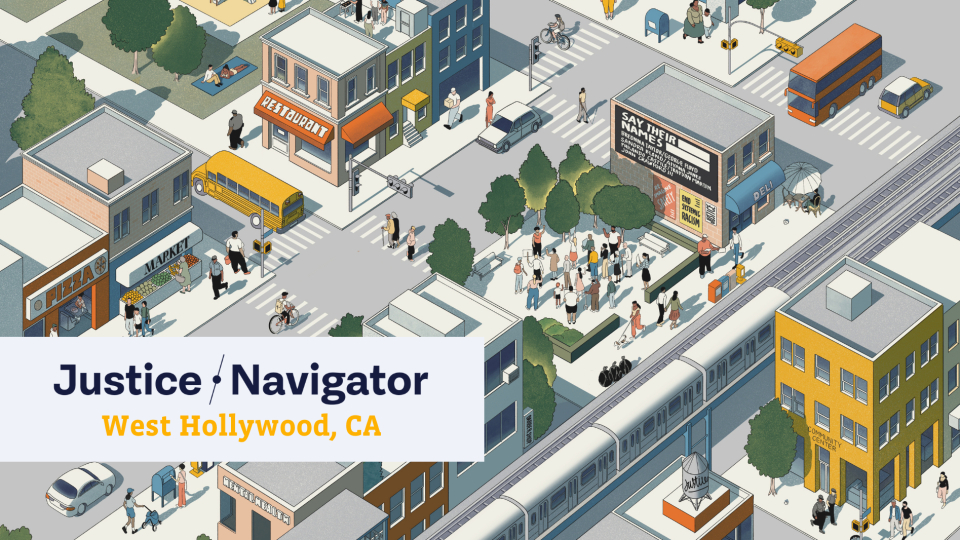This past August, CPE was busy in West Hollywood, CA, with the public rollout of our latest Justice Navigator Assessment. The assessment—which identifies racial disparities in police interactions with the community in the Los Angeles Sheriff's Department (LASD) West Hollywood Station’s use of force, traffic stop, non-traffic stop, and calls for service data—was shared in close collaboration with the LASD West Hollywood Station and City Council. We commend their support and enthusiasm in uplifting this research with the public.
West Hollywood’s data reveals what Black and Latinx communities—in California and across the country—have long known: police treat them inequitably. Our research found that deputies used force against Black and Latinx people at disproportionate rates compared to their shares of the population. While Black people made up 3.6% of the population of West Hollywood, they comprised 28% of all use of force incidents; Latinx people made up 11% of the population, but 22% of all use of force incidents. These inequities were echoed across the data: Black and Latinx drivers were searched more often than White drivers, despite searches of drivers in each racial group resulting in similar rates of found contraband; and deputies stopped Black and Latinx pedestrians at disproportionate rates (33% and 22%, respectively) compared to their shares of the population (3.6% and 11%, respectively).
While findings like these are dismaying, they shed important light on the steadfastly racialized nature of policing in the US. LASD West Hollywood Station is not particularly egregious in their treatment of Black and Latinx people; rather, our findings about their policing outcomes are quite standard in a country where the policing of Black and Latinx people is universally burdensome and unequal. The real difference is they have the decency to share it and have already taken steps to mitigate these inequities. LASD West Hollywood Station is in the process of building out an alternative response team whereby trained professionals—like medical first responders and social workers—respond to mental health crises in lieu of or alongside police. Teams like these are proven to reduce arrests, injury, and death of those experiencing mental health crises, who are disproportionately subject to violent policing. When we begin to see public safety as a question of public health, we improve safety for everyone.
Some other key takeaways from the assessment include:
- Black and Latinx drivers were stopped more often than White drivers for reasons recorded as equipment stops or license/registration checks, while White drivers were stopped more often for moving violations. 63% of stops of Black of drivers and 55% of stops of Latinx drivers were equipment stops or license/registration checks, which tend to be unrelated to public safety, compared to 48% of stops of White drivers. 52% of stops of White drivers were recorded as moving violations, compared to 36% of stops of Black drivers and 45% of stops of Latinx drivers.
- Only 13% of all recorded police activity involved reports of bodily harm, property harm or threats, including both officer-initiated activities and police responses to calls for service. More than 80% of calls for service that officers responded to were for requests related to public assistance, nuisances, traffic incidents, or medical/fire assistance. As mentioned, some of these events may have been addressed by the department’s alternative or co-response teams, but findings suggest further opportunities for addressing public safety needs via community-centered response models.
No one can solve problems that haven’t been identified, and with this Justice Navigator Assessment, law enforcement in West Hollywood can begin having difficult but necessary conversations with their communities and elected officials about how to create public safety systems that are more equitable for their respective Black and Latinx residents. US policing is the most violent among peer nations, which means the work we’re doing with our partners in LASD West Hollywood is beyond urgent; while we’ve got a long road ahead, our partnership is a necessary first step. Together, we can bring data, law enforcement, and communities together to enact meaningful change.

Individuals like you power all of our work. Consider donating today to support programming like this and other critical public safety redesign work.

